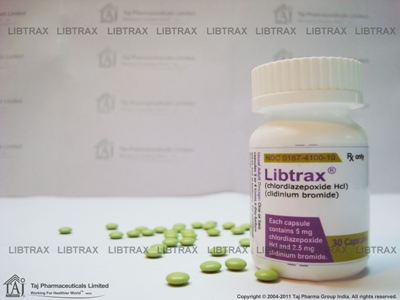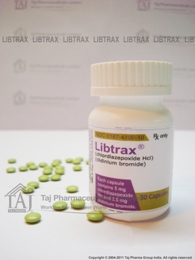|
|
Each Libtrax Tablets contains
5 mg chlordiazepoxide hydrochloride
2.5 mg clidinium bromide
Each capsule also contains corn starch, lactose and talc. Gelatin
capsule shells may contain methyl and propyl parabens and
potassium sorbate.
Libtrax
(chlordiazepoxide - clidinium)
How does this medication work? What will it do for me?
CHLORDIAZEPOXIDE BELONGS TO THE CLASS OF MEDICATIONS CALLED
BENZODIAZEPINES. CLIDINIUM BELONGS TO THE CLASS OF MEDICATIONS
CALLED ANTICHOLINERGICS. CHLORDIAZEPOXIDE AND CLIDINIUM ARE A
COMBINATION OF MEDICATIONS USED TO TREAT STOMACH AND INTESTINAL
PROBLEMS SUCH AS IRRITABLE BOWEL SYNDROME (IBS) AND ULCERS.
CHLORDIAZEPOXIDE - CLIDINIUM HELPS BY REDUCING THE AMOUNT OF
ACID FORMED IN YOUR STOMACH AS WELL AS BY RELIEVING THE PAIN OF
STOMACH SPASMS AND ABDOMINAL CRAMPS. OFTEN, RELIEF FROM SYMPTOMS
OCCURS WITH THE FIRST COUPLE OF DOSES.
This medication may be available under multiple brand names
and/or in several different forms. Any specific brand name of
this medication may not be available in all of the forms or
approved for all of the conditions discussed here. As well, some
forms of this medication may not be used for all of the
conditions discussed here.
Your doctor may have suggested this medication for conditions
other than those listed in these drug information articles. If
you have not discussed this with your doctor or are not sure why
you are taking this medication, speak to your doctor. Do not
stop taking this medication without consulting your doctor.
Do not give this medication to anyone else, even if they have
the same symptoms as you do. It can be harmful for people to
take this medication if their doctor has not prescribed it.
How should I use this medication?
The recommended adult dose of this medication is 1 or 2 Tablets
taken 1 to 4 times a day. The Tablets should be taken 30 to 60
minutes before a meal, unless otherwise instructed by your
doctor. For seniors, the dose should start at 1 capsule 2 times
a day, with adjustment to the dose as needed and tolerated. It
is important that the dose be individualized to your specific
needs to avoid excessive sedation or motor impairment.
This medication may be habit-forming when taken for long periods
of time. If you have been taking this medication regularly for a
long period of time (i.e., more than 1 month), do not stop
taking the medication without first speaking with your doctor.
To avoid withdrawal effects, a gradual dose reduction is usually
recommended when stopping this medication.
Many things can affect the dose of a medication that a person
needs, such as body weight, other medical conditions, and other
medications. If your doctor has recommended a dose different
from the ones listed here, do not change the way that you are
taking the medication without consulting your doctor.
It is important to take this medication exactly as prescribed by
your doctor. If you miss a dose, take it as soon as possible and
continue with your regular schedule. If your next dose is in
less than 4 hours, skip the missed dose and continue with your
regular dosing schedule. Do not take a double dose to make up
for a missed one. If you are not sure what to do after missing a
dose, contact your doctor or pharmacist for advice.
Store this medication at room temperature, protect it from light
and moisture, and keep it out of the reach of children.
Do not dispose of medications in wastewater (e.g. down the sink
or in the toilet) or in household garbage. Ask your pharmacist
how to dispose of medications that are no longer needed or have
expired.
Who should NOT take this medication?
Chlordiazepoxide - clidinium should not be taken by anyone who:
is allergic to clidinium, chlordiazepoxide, any other
medications belonging to the benzodiazepine class, or to any of
the ingredients of the medication
is breast-feeding
is pregnant or planning to become pregnant
has a hiatus hernia with reflux esophagitis
has a history of drug abuse or dependence
has an enlarged prostate
has active heart problems
has difficulty urinating
has glaucoma
has intestinal atony ("lazy bowel")
has liver disease
has myasthenia gravis
has ulcerative colitis
What side effects are possible with this medication?
Many medications can cause side effects. A side effect is an
unwanted response to a medication when it is taken in normal
doses. Side effects can be mild or severe, temporary or
permanent. The side effects listed below are not experienced by
everyone who takes this medication. If you are concerned about
side effects, discuss the risks and benefits of this medication
with your doctor.
The following side effects have been reported by at least 1% of
people taking this medication. Many of these side effects can be
managed, and some may go away on their own over time.
Contact your doctor if you experience these side effects and
they are severe or bothersome. Your pharmacist may be able to
advise you on managing side effects.
bloated feeling
decreased sweating
dizziness
drowsiness
dry mouth
headache
Although most of these side effects listed below don't happen
very often, they could lead to serious problems if you do not
check with your doctor or seek medical attention.
Check with your doctor as soon as possible if any of the
following side effects occur:
constipation
eye pain
insomnia
mental depression
nervousness or irritability
shortness of breath
skin rash or hives
slow heartbeat
sore throat and fever
unusual excitement
yellow eyes or skin
Stop taking the medication and seek immediate medical attention
if any of the following occur:
confusion
difficult urination
drowsiness (severe)
dryness of nose, mouth, throat (severe)
fast heartbeat
unusual warmth, dryness, and flushing of skin
Some people may experience side effects other than those listed.
Check with your doctor if you notice any symptom that worries
you while you are taking this medication.
Are there any other precautions or warnings for this medication?
Before you begin using a medication, be sure to inform your
doctor of any medical conditions or allergies you may have, any
medications you are taking, whether you are pregnant or
breast-feeding, and any other significant facts about your
health. These factors may affect how you should use this
medication.
Dental problems: Since one of the ingredients may cause a dry
mouth, there is an increase risk of dental disease.
Dependence and withdrawal: Physical dependence (a need to take
regular doses to prevent physical symptoms) has been associated
with benzodiazepines such as chlordiazepoxide - clidinium.
Severe withdrawal may occur if the dose is significantly reduced
or suddenly discontinued. These symptoms include seizures,
irritability, nervousness, sleep problems, agitation, tremors,
diarrhea, abdominal cramps, vomiting, memory impairment,
headache, muscle pain, extreme anxiety, tension, restlessness,
and confusion. Reducing the dose gradually under medical
supervision can help prevent or decrease these withdrawal
symptoms.
Drowsiness/reduced alertness: Because chlordiazepoxide -
clidinium may cause drowsiness and sedation, do not engage in
activities that require mental alertness, judgment, and physical
coordination (such as driving or operating machinery) while
taking this medication. This is particularly true when first
starting the medication and until you have established that
chlordiazepoxide - clidinium does not affect you this way.
Alcohol ingestion can increase the drowsiness effects and should
be avoided.
Medical conditions: Tell your doctor if you have any of the
following conditions, as it may influence whether your doctor
recommends this medication:
chronic obstructive pulmonary disease (COPD)
depression
glaucoma (open-angle)
hiatus hernia
high blood pressure
intestinal blockage
kidney disease
liver disease
mental illness
myasthenia gravis
overactive thyroid
ulcerative colitis
xerostomia (condition with severe loss of saliva)
People with an addiction to alcohol or other medications should
not take chlordiazepoxide, except in rare situations under
medical supervision.
Pregnancy: This medication should not be used during pregnancy
unless the benefits outweigh the risks.
Breast-feeding: This medication may pass into breast milk. If
you are a breast-feeding mother and are taking chlordiazepoxide
- clidinium, it may affect your baby. Talk to your doctor about
whether you should continue breast-feeding.
Children: The safety and effectiveness of using this medication
have not been established for children.
Seniors: Seniors may be at increased risk for the sedative and
impaired coordination effects of this medication. They need to
use extra caution, for example, when getting up during the
night.
What other drugs could interact with this medication?
There may be an interaction between chlordiazepoxide - clidinium
and any of the following:
alcohol
antacids
anticholinergic medications (e.g., atropine, hyoscyamine)
clarithromycin
diarrhea medicines that contain kaolin or attapulgite
fluconazole
fluvoxamine
itraconazole
ketoconazole
medications that cause sedation (e.g., antidepressants,
benzodiazepines, barbiturates, MAO inhibitors, narcotics,
phenothiazines, antihistamines)
nefazodone
phenytoin
potassium chloride
theophylline
warfarin
If you are taking any of these medications, speak with your
doctor or pharmacist. Depending on your specific circumstances,
your doctor may want you to:
stop taking one of the medications,
change one of the medications to another,
change how you are taking one or both of the medications, or
leave everything as is.
An interaction between two medications does not always mean that
you must stop taking one of them. Speak to your doctor about how
any drug interactions are being managed or should be managed.
Medications other than those listed above may interact with this
medication. Tell your doctor or prescriber about all
prescription, over-the-counter (non-prescription), and herbal
medications you are taking. Also tell them about any supplements
you take. Since caffeine, alcohol, the nicotine from cigarettes,
or street drugs can affect the action of many medications, you
should let your prescriber know if you use them.
What is Libtrax?
Libtrax is a capsule containing a combination of
chlordiazepoxide and clidinium. Chlordiazepoxide is a
benzodiazepine that affects chemicals in the brain that may be
unbalanced. Clidinium reduces stomach acid and decreases
intestinal spasms.
Libtrax is a medicine that may be effective in treating stomach
ulcers, irritable bowel syndrome, or symptoms related to
intestinal infection. Libtrax is given together with other
medications to treat these conditions.
The U.S. Food and Drug Administration has determined that
Libtrax is "possibly" effective in treating these conditions.
Because of the varied individual responses to tranquilizers and
anticholinergics, the optimum dosage of Libtrax varies with the
diagnosis and response of the individual patient. The dosage,
therefore, should be individualized for maximum beneficial
effects. The usual maintenance dose is 1 or 2 Tablets, 3 or 4
times a day administered before meals and at bedtime.
Geriatric Dosing
Dosage should be limited to the smallest effective amount to
preclude the development of ataxia, oversedation or confusion.
The initial dose should not exceed 2 Libtrax Tablets per day, to
be increased gradually as needed and tolerated.
Important information
You should not use Libtrax if you have glaucoma, and enlarged
prostate, bladder obstruction, or problems with urination.
Do not use Libtrax if you are allergic to chlordiazepoxide or
clidinium, or to other benzodiazepines, such as alprazolam (Xanax),
clorazepate (Tranxene), diazepam (Valium), lorazepam (Ativan),
or oxazepam (Serax). Libtrax can cause birth defects in an
unborn baby. Do not use this medicine if you are pregnant.
For the Consumer
Applies to chlordiazepoxide / clidinium: oral capsule
In addition to its needed effects, some unwanted effects may be
caused by chlordiazepoxide / clidinium. In the event that any of
these side effects do occur, they may require medical attention.
Major Side Effects
You should check with your doctor immediately if any of these
side effects occur when taking chlordiazepoxide / clidinium:
Incidence not known:
Abdominal or stomach pain
chills
clay-colored stools
confusion
cough or hoarseness
dark urine
difficulty with speaking
dizziness
drooling
drowsiness
fever
fever with or without chills
general feeling of tiredness or weakness
headache
itching
loss of appetite
loss of balance control
lower back or side pain
muscle trembling, jerking, or stiffness
nausea
painful or difficult urination
pale skin
rash
restlessness
shakiness and unsteady walk
shuffling walk
sore throat
sores, ulcers, or white spots on the lips or in the mouth
stiffness of the limbs
swelling
twisting movements of the body
uncontrolled movements, especially of the face, neck, and back
unpleasant breath odor
unsteadiness, trembling, or other problems with muscle control
or coordination
unusual bruising or bleeding
unusual tiredness or weakness
vomiting of blood
yellow eyes or skin
If any of the following symptoms of overdose occur while taking
chlordiazepoxide / clidinium, get emergency help immediately:
Symptoms of overdose:
Blurred vision
change in consciousness
difficulty having a bowel movement (stool)
dry mouth
lack of coordination
loss of consciousness
sleepiness or unusual drowsiness
Minor Side Effects
Some of the side effects that can occur with chlordiazepoxide /
clidinium may not need medical attention. As your body adjusts
to the medicine during treatment these side effects may go away.
Your health care professional may also be able to tell you about
ways to reduce or prevent some of these side effects. If any of
the following side effects continue, are bothersome or if you
have any questions about them, check with your health care
professional:
Incidence not known:
Inability to have or keep an erection
increase or loss in sexual ability, desire, drive, or
performance
increased or decreased interest in sexual intercourse
menstrual changes
skin blisters
For Healthcare Professionals
Applies to chlordiazepoxide / clidinium: oral capsule
Nervous system
The elderly and debilitated may be more susceptible to the side
effects of chlordiazepoxide-clidinium. Drowsiness, ataxia, and
confusion have occasionally been reported at the lower dosage
ranges.[Ref]
Nervous system side effects have included drowsiness, ataxia,
confusion, and extrapyramidal symptoms.
Chlordiazepoxide-clidinium may impair the psychomotor skills
necessary for driving. Changes in electroencephalogram (EEG)
patterns (low-voltage fast activity) have been reported during
and after chlordiazepoxide treatment.[Ref]
Gastrointestinal
Gastrointestinal side effects have included nausea,
constipation, and dryness of the mouth.[Ref]
Hematologic
Hematologic side effects have included blood dyscrasias
(including agranulocytosis).[Ref]
Hepatic
Hepatic side effects have included jaundice and hepatic
dysfunction.[Ref]
Other
Other side effects have included increased and decreased libido,
edema, and withdrawal symptoms. Rarely, syncope has been
reported.[Ref]
Withdrawal symptoms after abrupt cessation of
chlordiazepoxide-clidinium may include dysphoria, insomnia,
convulsions, tremor, abdominal and muscle cramps, vomiting,
sweating, agitation, restlessness, and anxiety.
How should I take Libtrax?
Take Libtrax exactly as it was prescribed for you. Follow all
directions on your prescription label. Your doctor may
occasionally change your dose to make sure you get the best
results. Do not use this medicine in larger or smaller amounts
or for longer than recommended.
Libtrax is usually taken before meals and at bedtime. Follow
your doctor's instructions.
Chlordiazepoxide may be habit-forming. Never share Libtrax with
another person, especially someone with a history of drug abuse
or addiction. Keep the medication in a place where others cannot
get to it. Selling or giving away this medicine is against the
law.
Do not stop using this medicine suddenly after long-term use, or
you could have unpleasant withdrawal symptoms. Ask your doctor
how to safely stop using Libtrax.
Call your doctor if your symptoms do not improve, or if they get
worse.
Store at room temperature away from moisture and heat.
Keep track of the amount of medicine used from each new bottle.
Libtrax is a drug of abuse and you should be aware if anyone is
using your medicine improperly or without a prescription.
Libtrax dosing information
Chlordiazepoxide hydrochloride is a versatile, therapeutic agent
of proven value for the relief of anxiety and tension. It is
indicated when anxiety, tension or apprehension are significant
components of the clinical profile. It is among the safer of the
effective psychopharmacologic compounds.
USES
This medication is used along with medications that treat stomach
ulcers. This combination product contains 2 medicines,
chlordiazepoxide and clidinium. Chlordiazepoxide belongs to a
class of drugs known as benzodiazepine anxiolytics. It works by
relieving anxiety. Clidinium belongs to a class of drugs known
as anticholinergics. It may help symptoms of cramping and
abdominal/stomach pain by decreasing stomach acid, and slowing
the intestines.
|
 |
DOSAGE AND ADMINISTRATION
Because of the varied individual responses to tranquilizers and
anticholinergics, the optimum dosage of Libtrax varies with the
diagnosis and response of the individual patient. The dosage,
therefore, should be individualized for maximum beneficial
effects. The usual maintenance dose is 1 or 2 Tablets, 3 or 4
times a day administered before meals and at bedtime.
Geriatric Dosing
Dosage should be limited to the smallest effective amount to
preclude the development of ataxia, oversedation or confusion.
The initial dose should not exceed 2 Libtrax Tablets per day, to
be increased gradually as needed and tolerated.
WARNINGS
As in the case of other preparations containing CNS-acting drugs,
patients receiving Libtrax should be cautioned about possible
combined effects with alcohol and other CNS depressants. For the
same reason, they should be cautioned against hazardous
occupations requiring complete mental alertness such as
operating machinery or driving a motor vehicle.
CONTRAINDICATIONS
Libtrax is contraindicated in the presence of glaucoma (since the
anticholinergic component may produce some degree of mydriasis)
and in patients with prostatic hypertrophy and benign bladder
neck obstruction. It is contraindicated in patients with known
hypersensitivity to chlordiazepoxide hydrochloride and/or
clidinium bromide.
PATIENT INFORMATION
To assure the safe and effective use of benzodiazepines, patients
should be informed that, since benzodiazepines may produce
psychological and physical dependence, it is advisable that they
consult with their physician before either increasing the dose
or abruptly discontinuing this drug.
SIDE EFFECTS
Drowsiness, blurred vision, dry mouth, dry eyes, constipation, or
increased heartbeat may occur. If any of these effects persist
or worsen, tell your doctor or pharmacist promptly.
To relieve dry mouth, suck on hard candy or ice chips, chew gum,
drink water, or use a saliva substitute.
To prevent constipation, maintain a diet adequate in fiber, and
drink plenty of water. If you become constipated while using
this drug, consult your pharmacist for help in selecting a
laxative (e.g., stimulant-type with stool softener).
Presentation
Usual Adult Dose for Peptic Ulcer:
Chlordiazepoxide 5 mg-clidinium 2.5 mg oral Tablets: 1 or
2 Tabletss orally 3 or 4 times daily before meals and at bedtime
Usual Adult Dose for Irritable Bowel Syndrome:
Chlordiazepoxide 5 mg-clidinium 2.5 mg oral Tablets: 1 or
2 Tabletss orally 3 or 4 times daily before meals and at bedtime
Usual Adult Dose for Enterocolitis:
Chlordiazepoxide 5 mg-clidinium 2.5 mg oral Tablets: 1 or
2 Tabletss orally 3 or 4 times daily before meals and at bedtime
Usual Geriatric Dose for Peptic Ulcer:
Chlordiazepoxide 5 mg-clidinium 2.5 mg oral Tablets: 1
Tablets orally twice daily
Dose may be increased gradually as needed and tolerated.
Usual Geriatric Dose for Irritable Bowel Syndrome:
Chlordiazepoxide 5 mg-clidinium 2.5 mg oral Tablets: 1
Tablets orally twice daily
Dose may be increased gradually as needed and tolerated.
Usual Geriatric Dose for Enterocolitis:
Chlordiazepoxide 5 mg-clidinium 2.5 mg oral Tablets: 1
Tablets orally twice daily
Dose may be increased gradually as needed and tolerated.
|
|

%20banner%202.png)
%20banner%201.png)


.png)
%20banner%20side.png)





%20banner.png)